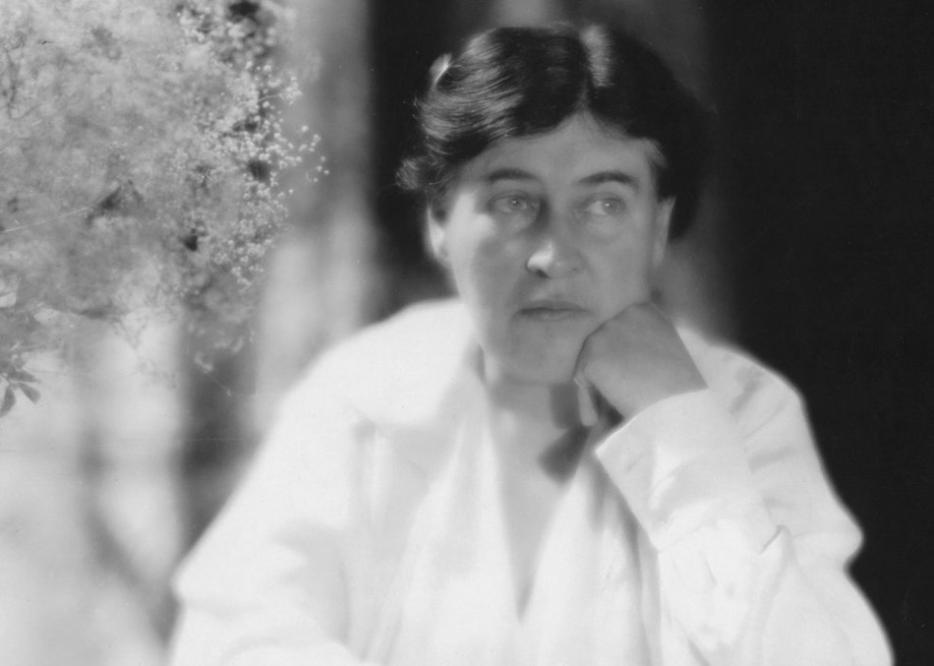In 1904, an Iowa lawyer spent several evenings burning four trunkfuls of letters. Their original recipient had promised the writer she would burn them herself, but she kept them instead. When she died, she asked her son to burn them. He didn’t, and when he died, his wife, Mollie Clemens, didn’t burn them either. It was only after Mollie died that John R. Carpenter, the lawyer in charge of her estate, discovered the cache of letters from Samuel Clemens, better known as Mark Twain. Twain’s mother, brother, and sister-in-law had failed to honour his request, but the lawyer scrupulously guarded the flames while, as the New York Times reported, “A treasure trove of unique value went up in smoke.”
Who did the right thing—the family or the lawyer? “It isn’t an ethical question if it’s a matter of fact,” says Janis Stout, co-editor with Andrew Jewell of the new Selected Letters of Willa Cather. “It’s not like ‘apples are red or apples are purple,’—you don’t have to make an ethical decision about that.” Stout and Jewell are currently getting a lot of flack for choosing to make Cather’s famously private life public for the first time: Harper’s calls their decision “self-serving,” and Jezebel cautions readers that, “with every page you turn, you’re dancing a little more zestfully on Willa Cather’s grave.” Stout is from Texas, and it’s the Guardian’s assessment that tickles her the most: “I’ve never been called a ‘cheeky blighter’ before.”
Dead writers are both more dead and more alive than other people. More alive, because their works carry them forward past the span of their own lifetimes. More dead, because the public value of their writing means that, sooner or later, someone will end up overruling their right to keep it private.
Willa Cather was born in 1873, and by the time she died in 1947, she had written the canonical American works My Ántonia, O Pioneers!, and Death Comes for the Archbishop. By 1919, she was writing her family to complain that reporters kept catching her doing the dishes in her least flattering apron. In 1922, she won the Pulitzer Prize for the World War I novel One of Ours, which prompted twenty-four-year-old Hemingway to sneer that she had stolen the last scene from Birth of a Nation: “Poor woman she had to get her war experience somewhere.” While she remained popular with readers, the new generation of modernist writers and critics attacked or dismissed her, and by 1935 she had developed an aversion to publicity so intense that, as Joan Acocella wrote in a 1995 New Yorker article, “When she checked into a hospital—indeed, when she called a beauty parlor—she used a false name.” In her will, Cather left strict instructions: the thousands of letters to family and friends she had written over her lifetime were never to be published.
Kafka and Virgil are cases in which the decision to publish, when they said burn, resulted in the preservation of works we now see as cornerstones of Western literature.
In having her work published posthumously against her stated wishes, Cather is in good company. She herself was in love with Virgil, and in My Ántonia, she writes: “After he had faced the bitter fact that he was to leave the ‘Aeneid’ unfinished...[he] decreed that the great canvas, crowded with figures of gods and men, should be burned rather than survive him unperfected[.]” But when Virgil died, in 19 B.C., the emperor Augustus told his executors, Lucius Varius Rufus and Plotius Tucca, not to be silly. “Perfection” is a slippery notion, and if writers held off publication until they believed they had reached it, we would have no literature at all.
Where Virgil only wanted to destroy his unfinished work, Kafka burnt the majority of what he wrote. During his lifetime only the short story collections Contemplation and A Country Doctor were published. When Kafka died of tuberculosis in 1924, he charged his friend Max Brod with the task of burning everything that was left. Like Rufus, Tucca, and the Clemens family, however, Brod didn’t do this. Instead, within the next three years he published The Trial, The Castle, and Amerika, and stashed the rest in a suitcase. He published a collected works in 1935, and then fled Prague for Palestine. Last year, an Israeli court decreed that the papers he brought with him, which had ended up in the possession of Brod’s lover’s daughters, in fact belonged to “the Jewish people”—loosely interpreted, in this case, as the Israeli National Library.
Kafka and Virgil are cases in which the decision to publish, when they said burn, resulted in the preservation of works we now see as cornerstones of Western literature. Writers are often their own worst critics, and while this can be a help (neurotic perfectionism goaded Virginia Woolf through seven drafts of Voyage Out), it can also be a hindrance (she sank into a deep depression every time she finished a novel). If you’re any good, you know how far the finished work is from what you’d hoped to achieve, and can be endlessly disappointed in yourself. The public, however, isn’t judging the work against the perfect, unattainable vision in the author’s mind. The work becomes itself only once it detaches from the author, who can never truly see it as it is. Its value can only be judged by others.
Of course, “value” has a meaning beyond artistic merit. When Vera Nabokov ran after her husband to stop him from throwing his draft of Lolita into the furnace, civilization got lucky. But when Dmitri Nabokov published his father’s last, unfinished novel—The Original of Laura—the Guardian’s William Skidelsky sniped that the book would “have a more significant impact on the size of Dmitri Nabokov’s bank balance than it ever will on the world of letters.” Publishing a deceased author’s work can be seen as intellectual grave-robbery. Max Brod’s lover ended up selling a manuscript of The Trial for $2 million in 1988, and before the Israeli court awarded the rest to the National Library, her daughters tried to sell his papers to the highest bidder—by weight, as if Kafka’s ideas really were gold.
The charge of enriching and promoting oneself while claiming a pious desire to preserve important literary artifacts has also been laid against John Middleton Murry, the husband of New Zealand writer Katherine Mansfield. Mansfield, who was born fifteen years after Willa Cather, died a good 24 years earlier after a brief and tempestuous life. Her husband not only brought out three books of her work the year she died, but four years later, in 1927, he published her journal, and within two more years he had published two volumes of her letters.
It’s hard to begrudge him his lucrative curation of his wife’s legacy, because the letters are lovely. “Immediately you had gone the house fell fast asleep, and it refuses to wake up or so much as smile in a dream until next Friday,” Mansfield writes to Murry while they are separated. “O Tig, you were so sweet, and so like a little child that I feel like crying when I write it. I adore you, darling,” he writes back.
A window onto this intimate vulnerability would be fascinating no matter who wrote the letters—which seems to illustrate another problem with publishing an author’s private writings. In her forward to a revised edition of letters between Mansfield and Murry published in 1988, Cherry A. Hankin enthused, “The correspondence of Katherine Mansfield and John Middleton Murry is a story in its own right, one more compelling, more poignant, than any she ever invented.” For any writer, this is a slap in the face. For a writer who produced what Virginia Woolf called, “the only writing I have ever been jealous of,” it is absurd. It’s easier to “relate” to a collection of knowable facts and anecdotes than it is to engage with a complex work of art. But reducing a writer to a mere personality is to ignore why we care about her in the first place. Everyone has a biography; the difference between Katherine Mansfield and anyone in a tumultuous love affair is that she wrote books, and the impact of her writing does not depend on a personal connection with her. That doesn’t stop readers from wanting one. Some readers will always want to get behind the curtain and see Oz himself, preferably in his emerald underwear.
When Vera Nabokov ran after her husband to stop him from throwing his draft of Lolita into the furnace, civilization got lucky. But when Dmitri Nabokov published his father’s last, unfinished novel—The Original of Laura—the Guardian’s William Skidelsky sniped that the book would “have a more significant impact on the size of Dmitri Nabokov’s bank balance than it ever will on the world of letters.”
In a way, Cather may still be having the last laugh. In an introduction to a previous book, Stout wrote, “In some ways Cather’s letters are disappointingly inexpressive.” Stout was talking about the fact that Cather never mentions Georgia O’Keefe, even though her groundbreaking Armory show was on exhibit while Cather lived in New York, or discusses the anthropological work of Franz Boas even though she knew his wife. For readers who know only enough about Cather to have heard that her sexuality has been a topic of debate, Cather’s letters are disappointing in their steadfast lack of salaciousness. In the 1970s and ‘80s, Cather studies exploded as feminists and queer theorists found reasons to claim her, much the way right-wing conservatives had claimed her in the 1930s. Scholarly books on Cather performed drawn-out exegeses of the landscapes in her novels; Ellen Moers argued that a detailed description of a canyon was, in fact, a loving depiction of a vagina. Acocella wrote, “This was not entirely far-fetched. Cather’s description—the V-shaped gorge, the internal ridges, the fringe of foliage—does sound a little like a crotch, though it sounds a lot more like a canyon.” Sometimes we want to know more about a person because we hope she will confirm our vision of the world, or the world as it should be. Cather lived with Edith Lewis for forty years, but no one has ever been able to prove whether they had sex. Maddeningly, the letters still don’t make it clear.
Even though the letters don’t reveal any sensational secrets, Stout admits to some mixed feelings about releasing them: “There can be a little ghost whispering in the ear, ‘Guilty, guilty, guilty.’” Ann Close, the Knopf editor who worked with Stout and Jewell on the collection, also says, of the first time she opened the printed and bound volume, “I have to admit, I had a twinge.” It’s worth noting, however, that Cather’s very first work in print was also sent into the world without her consent. As an undergraduate at the University of Nebraska in 1891, Cather wrote an essay on Thomas Carlyle, and her professor liked it so much he submitted it to the Nebraska State Journal. Cather later said it was the “hypnotic effect” of seeing her name in print that turned her away from her original course of study—medicine—and made her a writer.
I feel fine about reading Cather’s letters for one simple reason: I’m not really a big Cather fan. This isn’t to say that only my favourite authors deserve their privacy. It’s to say that because I like My Ántonia without loving it, I don’t mind being reminded that Willa Cather existed. It doesn’t disillusion me to know that she based Ántonia on Anna Sadilek, a Czech girl in her own Nebraska hometown, or that she was scrappy and hardheaded about how her books were marketed. But for the books I love the most, I’m so jealous of my reading experience that I don’t want to let anyone—even its creator—come between me and the work. I don’t want to know what Joseph Heller was like, and I definitely don’t want to know what Philip Roth is like.
It may be impossible to know what Willa Cather was like, even if you read all 3,000 of her surviving letters. A letter, even an intimate one, is still a performance of personality. When you write your elderly aunt, you pretend to espouse her opinions because it’s not worth arguing about, and when you write your lover, you spend half the time apologizing, as Mansfield and Murry did, for imaginary disagreements and coldnesses. Maybe the Cather who complained about the mosquitoes in Venice and exalted Napoleon’s tomb as “the only thing I have ever found in the world which did not at all disappoint” was less real than Cather chanelling Thea Kronborg or Father Jean Marie Latour. A writer’s own voice may find its best expression in the guise of someone else.
--
Find Hazlitt on Facebook / Follow us on Twitter






